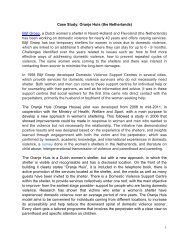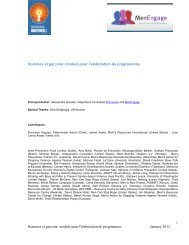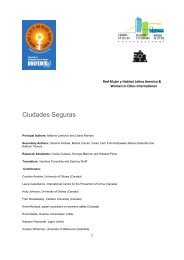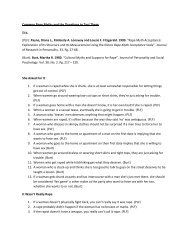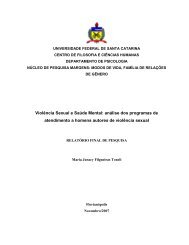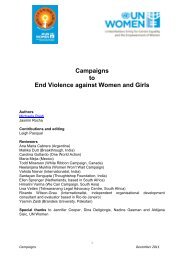Download PDF - Virtual Knowledge Centre to End Violence against ...
Download PDF - Virtual Knowledge Centre to End Violence against ...
Download PDF - Virtual Knowledge Centre to End Violence against ...
Create successful ePaper yourself
Turn your PDF publications into a flip-book with our unique Google optimized e-Paper software.
� Longer term programmes are needed <strong>to</strong> change ingrained gender norms;<br />
� Be realistic about what can be achieved within a short period of time;<br />
� Obtaining long-term financial support may be difficult <strong>to</strong> achieve given that<br />
funding for programmes with men have tended <strong>to</strong> support shorter-term initiatives;<br />
and<br />
� It may be necessary <strong>to</strong> educate donors about the need for long-term financial<br />
support and about the limits of short-term interventions.<br />
______________________________________________________________________<br />
Ensure programmes are designed <strong>to</strong> deal with barriers that men may face when<br />
addressing gender-based violence. (From Funk, R. 2006, p.85)<br />
These barriers can include:<br />
� Lack of role models;<br />
� Not knowing what <strong>to</strong> do;<br />
� Not wanting <strong>to</strong> look foolish;<br />
� Appearing <strong>to</strong>o feminine;<br />
� Appearing <strong>to</strong>o sensitive;<br />
� Not fitting in with the men they know;<br />
� Feeling hesitant <strong>to</strong> challenge others about behaviour that they themselves may<br />
have done just last week or last night;<br />
� Guilt;<br />
� Fear of the intensity of issues, giving up male privilege, facing men‟s anger,<br />
being a trai<strong>to</strong>r, and being labelled gay; and<br />
� Anger about the issues, at themselves, and at other men.<br />
A man who is changing his life and becoming more gender equitable may be seen as a<br />
threat <strong>to</strong> other men who may ridicule or harass him (de Keijzer 2004; Berkowitz 2004).<br />
Be careful not <strong>to</strong> generate other inequalities or further entrench gender<br />
stereotypes<br />
All programmes working with men and boys, even those addressing other issues, such<br />
as HIV and AIDS, should consider whether their approaches, messages and/or imagery<br />
unintentionally reinforce unhelpful traditional stereotypes about men and women that<br />
contribute <strong>to</strong> violence <strong>against</strong> women and girls.<br />
Programmes that involve transformation in gender roles and social norms should also<br />
be conscientious about unintentionally generating other gender discrimina<strong>to</strong>ry attitudes<br />
(such as men feeling that they need <strong>to</strong> „protect‟ women by limiting their mobility,<br />
freedom or privacy) or anti-equality perspectives such as homophobia that sometimes<br />
arise. The sexual orientation of men who speak out <strong>against</strong> sexism is often questioned,<br />
as a conscious or unconscious strategy intended <strong>to</strong> silence them, resulting in few men<br />
who do speak out (Jackson Katz).<br />
Men and Boys <strong>Knowledge</strong> Module January 2012 34



